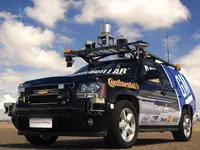Continental-Sponsored Chevy Tahoe Starts DARPA Urban Challenge from Pole Position
Automotive supplier's active safety sensor technology plays key role in effort by Carnegie Mellon University's Tartan Racing team
VICTORVILLE, Calif., Nov. 3 -- Carnegie Mellon University's Tartan Racing team, sponsored in part by Continental Automotive Systems, began today's race from the Pole Position this morning and sped onto the course at the Defense Advanced Research Projects Agency (DARPA) Urban Challenge, held at the former George Air Force Base in Victorville, Calif.
Continental, a global leader in active safety technology, is providing five radar sensors to each of the team's two vehicles, only one of which will actually compete in the Urban Challenge. These sensors are positioned on a Chevy Tahoe to provide its artificial intelligence with a 360-degree view of the environment. They can detect objects at distances of up to 200 meters, and are especially effective at determining the speed of moving objects around the autonomous vehicle. Two Continental laser sensors mounted on Boss provide similar information on the driving environment, but use light rather than radar waves to gather data.
In total, the vehicle is equipped with 27 sensors and a unit that combines GPS and inertial measurements. Together with Continental sensor data fusion technology and expertise -- provided by embedded engineer Michael Darms -- the data is combined into a precise picture of the driving environment for Boss to consider as it traverses the course. The sensors provide Boss with a clear perception of the roadway and any obstacles it must overcome. Then, its advanced behavior algorithms decide on the best option to plan its way through the urban course. More than one sensor is pointed in each direction, providing redundancy and complementarity.
The autonomous vehicles in the DARPA Urban Challenge were required to navigate, park and handle traffic on a 60-mile suburban course within a six- hour time limit. The vehicles operated without human guidance and relied only on sensors and computers. They also had to obey traffic laws, merge into moving traffic, avoid obstacles and negotiate intersections. The Tartan racing Team competed against nearly about a dozen challengers.
About Tartan Racing
Tartan Racing is committed to automotive safety and convenience, and to the broader future of robotics. Tartan Racing's self-driving Chevy Tahoe, called "Boss," includes ten computers with 200,000 lines of software at the wheel, along with lasers, radars and cameras that sense roads and other cars. Boss already has logged hundreds of test miles. Two identical versions of Boss have been developed to enable extra testing and experience. Only one competed in the Urban Challenge, since only one vehicle is permitted per team.
In addition to Continental, other major sponsors of Tartan Racing include General Motors and Caterpillar. Additional sponsors include Intel, Google, Applanix, TeleAtlas, NetApp, Vector CANTech, Ibeo, Mobileye, HP, CarSim, Clean Power Resources and M/A-COM. Tartan Racing includes team members from Carnegie Mellon and sponsors.
About Continental
The Continental Corporation is a leading automotive supplier of brake systems, chassis components, vehicle electronics, tires and technical elastomers. In 2006 the corporation realized sales of EUR14.9 billion. At present it has a worldwide workforce of around 89,000.
As a worldwide leading technology and systems partner to the automotive industry, the Automotive Systems Division of Continental AG integrates extensive know-how and uncompromising quality in the fields of active and passive driving safety, embedded telematics and hands-free communication systems, power-train and comfort. In 2006 the Division achieved sales of approx. Euro 6 billion with a workforce of more than 30,000. Continental Automotive Systems develops and produces electronic and hydraulic brake, stability and chassis control systems, electronic air suspension systems, sensors, engine management and transmission control systems, hybrid drives, cooling fan modules, body and security electronics and also is the industry leader of embedded telematics and communication systems in vehicles.



